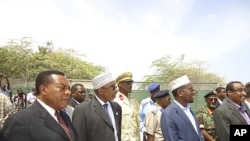Somalia's Transitional Federal Government has signed a roadmap intended to move the country out of its transitional era. While the roadmap outlines an ambitious plan to solve Somalia’s many ills, some observers are skeptical.
After many starts and stops, Somalia’s Transitional Federal Government may finally be on its way to fulfilling the mandate given it over seven years ago by the international community.
Late Tuesday, the TFG wrapped up a three-day conference aimed at ending the country’s long transitional period. The president, prime minister and speaker of Somalia’s parliament signed a roadmap to realize the long-awaited goals of national elections and a new constitution.
Those tasks were supposed to have been fulfilled by this August, but the infighting and political intransigence which has characterized much of the TFG’s existence since 2004 prevented their implementation.
The roadmap to end Somalia’s transitional period is very ambitious, but Abdiwahab Sheikh Abdisamed, a Somalia analyst at the University of Nairobi, believes it is unrealistic given the current instability throughout the country.
“This is a good roadmap, where I can say 35 percent is achievable while 65 percent is not practical. It depends on the situation on the ground. Today TFG, they are controlling only Mogadishu area. The rest of the area is now under control of the outlawed al-Shabab militia.”
The new roadmap, brokered by representatives from the United Nations, is based on four major benchmarks: security, the constitution, political outreach, and reconciliation and good governance.
The document calls for a new constitution to be adopted by July 1 of next year, with parliamentary elections to take place on August 20. International observers are especially interested in seeing the elections take place as not one person in Somalia’s 550-member parliament was elected by the Somali people.
For all its grand designs, however, observers say there is cause for concern. Despite the participation of the breakaway Somali regions Puntland and Galmudug, one analyst close to the events, who asked not to be identified for this story, said relations between the regions were cool at best.
And while the TFG and the United Nations have praised the inclusiveness of the conference, others are concerned by a lack of representation for some stakeholders, specifically the government-allied militia Ahlu Sunna Wal Jamaa. The group’s support has been crucial in the battle against al-Qaida-linked militia al-Shabab, but its leadership is far from united. While delegates from the Benadir region were in attendance, representatives of Ahlu Sunna from the contentious Galmudug region were not involved.
There is also some concern about anti-corruption legislation. The Somali parliament - which has been accused of massive corruption in the past - will be in charge of drafting laws and appointing watchdogs to police the government.
Somalia has not had a stable central government in 20 years, since warlords overthrew President Mohamed Siad Barre.
Somalia Transitional Roadmap Ambitious, Analysts Skeptical




